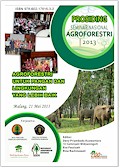| Paper |
 |
|
| Title | Pengelolaan Hutan Bersama Masyarakat (Phbm) Di Das Konto Malang: Pembelajaran Keberhasilan Dan Kegagalan Program | | Author | Noviana Khususiyah | | Editor | Devy Priambodo Kuswantoro, Tri Sulistyati Widyaningsih, Eva Fauziyah and Rina Rachmawati | | Year | 2013 | | Parent Title | Prosiding Seminar Nasional Agroforestri 2013. “Agroforestri untuk Pangan dan Lingkungan yang Lebih Baik”. Malang, 21 Mei 2013 | | Publisher | Balai Penelitian Teknologi Agroforestry, Fakultas Pertanian Universitas Brawijaya, World Agroforestry Centre (ICRAF) - Southeast Asia Regional Program, and Masyarakat Agroforestri Indonesia | | City of Publication | Malang, Indonesia | | Date | 2013-05-21 | | Pages | 525-530 | | Call Number | PP0344-14 | | Keywords | community collaborative forest management (PHBM), community perceptions, Konto watershed |
|
| Abstract: |
| The pressures of population, economics and politics have contributed to natural resources’ exploitation and
land degradation including forestry. Generally, forest management in Java is carried out by the Forestry State
Enterprise (Perum Perhutani). Joint Community Forest Management (PHBM) is a program initiated by the
Ministry of Forestry that involves the community in managing forests. The program was intended to reduce
forest destruction and conflicts with communities, particularly in Java. One of the programs was implemented
in Konto Watersheds, Malang, East Java that are covered two sub-districts, Ngantang and Pujon. However,
PHBM program in Konto watershed was considered unsuccessful due to illegal logging, encroachment and
forest fires. The objectives of this research are: (1) to analyze factors influence the successfulness of PHBM
program, (2) to analyze factors influence community knowledge of PHBM Program. Field observations,
interviews with households and a literature study were conducted to collect data. We used multiple linear
regression analysis to reveal the factors influencing success and binary logistic regression analysis to reveal the
factors influencing farmers’ knowledge. The results of this research were that the factors influencing success
were the husband and wife’s perceptions, household income, manner of get land from Perhutani (buying or
inheritance and share cropping) and age of respondent. Perceptions of PHBM were influenced by income,
formal education, secondary jobs, extension services and the wife’s knowledge of the program. |
|